Tuesday, November 30, 2004
DIY Karma Repair Kit
My sounding for silence yesterday brought some response. Maybe I should apologise:I did not mean to say that UMM is like a market-place, I just found it inappropriate that an institution of higher learning should have a television set blaring out loud in the cafetaria. I feel that the prelude to thinking is silence, as it is to many other pursuits - meditation, self-appreciation, beauty. Reflection is best done in tranquility, not in a milieu of noise.
Right after my walk in the Charing Cross Road the other day I turned left into Cecil Court, a little side-street that is now taking the mantle of the old Charing X as a street of books. I used to drop in at Watkins bookshop during my student days, when Geoffrey Watkins (the founder's son) was still there minding the shop. It was a bookshop unlike any other, where theosophy rubbed shoulders with alien wanderers, and alternative health sat side by side with many gurus. There was Feldenkrais, and Alexander and Rolfing was rife. There was magic and Magick, and the Sufism of Idries Shah (ugh!); and Rumi and many others. A nice break from the stiff rationalism of the College I was at, just a stone's throw from where Jeremy Bentham was said to have been preserved and dragged in at every meeting of the Board. But the hands that fill the shelves there now are no longer Mr Watkins's, and the shop's taken a new, gleaming aura that has also spread into a new annexe a few doors away.
In Cecil Court I looked into the window of one of the shops opposite Watkins and saw some instructions on how to repair your Karma which I thought was interesting, made a quick mental note, then just as quickly consigned it to the back of my mind where lie many items of forgetfulness. When I received an email yesterday in response to my UMM spiel, I decided to search Google to see if it's there. It, of course, is. It's a short work by the poet Richard Brautigan, which I reproduce below as a set of instructions to myself and all those people who've never been far away from the sound of noise:
ß
DIY Karma Repair Kit
Right after my walk in the Charing Cross Road the other day I turned left into Cecil Court, a little side-street that is now taking the mantle of the old Charing X as a street of books. I used to drop in at Watkins bookshop during my student days, when Geoffrey Watkins (the founder's son) was still there minding the shop. It was a bookshop unlike any other, where theosophy rubbed shoulders with alien wanderers, and alternative health sat side by side with many gurus. There was Feldenkrais, and Alexander and Rolfing was rife. There was magic and Magick, and the Sufism of Idries Shah (ugh!); and Rumi and many others. A nice break from the stiff rationalism of the College I was at, just a stone's throw from where Jeremy Bentham was said to have been preserved and dragged in at every meeting of the Board. But the hands that fill the shelves there now are no longer Mr Watkins's, and the shop's taken a new, gleaming aura that has also spread into a new annexe a few doors away.
In Cecil Court I looked into the window of one of the shops opposite Watkins and saw some instructions on how to repair your Karma which I thought was interesting, made a quick mental note, then just as quickly consigned it to the back of my mind where lie many items of forgetfulness. When I received an email yesterday in response to my UMM spiel, I decided to search Google to see if it's there. It, of course, is. It's a short work by the poet Richard Brautigan, which I reproduce below as a set of instructions to myself and all those people who've never been far away from the sound of noise:
Karma Repair Kit: Items 1-4
By Richard Brautigan
1. Get enough food to eat,
and eat it.
2. Find a place to sleep where it is quiet,
and sleep there.
3. Reduce intellectual and emotional noise
until you arrive at the silence of yourself,
and listen to it.
4.
ß
DIY Karma Repair Kit
Monday, November 29, 2004
Malaysian Din Sum
Last July, for my sins, I found myself on the campus of the Multimedia University (UMM). It was the first time I'd stepped into the hallowed gounds of a Malaysian university campus for a long time, and UMM reminded me very much of University Malaya (UM) at its height, when students were bright and enthusiastic and knew about a thing or three. Though never a student there, I remember the UM campus as a tranquil place, with the lake and the trees, and the agriculture faculty that backed into a jungle that still had monkeys swinging from the trees. There was also the Speaker's Corner under a big tree in front of the Library, and every afternoon a very fit, very bearded man would jog around the campus, smiling hello to all and sundry. He was the vice-chancellor, probably the last of the great vice-chancellors of a Malaysian university.
There were big debates then on the campus, and students demonstrated, spoke, then graduated and disappeared and blended with the crowd outside. A few carried on their good fight in the outside world, but I do know a few left-wing Marxist leaning professors too who left and became successful bankers. The first sign of rot started in the UM when the lakes became silted form the residue of development high above, then, the final blow came when the subject of the Great Debate shifted from issues of the Malaysian economy to whether the campus of this hallowed university should house a McDonald's close to its gate. When I heard that, I knew that its days were seriously numbered.
So I was heartened when, on the UMM campus I felt a buzz come back that I thought had long gone, but there was one thing that tugged at my sleeve. And that was the noise. How unsuitable for a university campus, where you'd want to sit and think and meditate, and read or write a few lines maybe, to be drowned in noise wherever you turn. And then I looked further out and noticed a Malaysian predilection, that we are so afraid of silence that we've filled the air with this soul-destroying distraction. I remember those express buses that trundled out of town on their long distance runs, there'd be the video playing all day and night; in taxis the driver would turn on the radio full blast, in the airports televisions would flicker all day long and fill the air with sound, very loud sound.
The same too in houses, shops, restaurants. The young — and some old ones too — never go anywhere nowadays without their portable plug-into-the-ears soundtrack, and there's hardly a place in town where you can go to for a bit of quiet. You visit a friend, and the first thing the host does is to turn on the telly as you sit there trying to hold a decent chat. Do we ever sit and reflect, in an atmosphere of calm? What effect does this have on our soul and psyche?
Last Sunday I met a Malaysian — well, half of him is ours, the other half belongs to Blighty — who'd just come back after working ten years in Malaysia. "How different was KL from London?" I asked. He said, well, he did think about that when he was out there, and for a long time he couldn't think of anything significant except for the weather and all those things that you'd expect. Then, he remembered something of London that he'd missed. The silence. In KL there's noise in every damned place.
ß
Malaysian Din Sum
There were big debates then on the campus, and students demonstrated, spoke, then graduated and disappeared and blended with the crowd outside. A few carried on their good fight in the outside world, but I do know a few left-wing Marxist leaning professors too who left and became successful bankers. The first sign of rot started in the UM when the lakes became silted form the residue of development high above, then, the final blow came when the subject of the Great Debate shifted from issues of the Malaysian economy to whether the campus of this hallowed university should house a McDonald's close to its gate. When I heard that, I knew that its days were seriously numbered.
So I was heartened when, on the UMM campus I felt a buzz come back that I thought had long gone, but there was one thing that tugged at my sleeve. And that was the noise. How unsuitable for a university campus, where you'd want to sit and think and meditate, and read or write a few lines maybe, to be drowned in noise wherever you turn. And then I looked further out and noticed a Malaysian predilection, that we are so afraid of silence that we've filled the air with this soul-destroying distraction. I remember those express buses that trundled out of town on their long distance runs, there'd be the video playing all day and night; in taxis the driver would turn on the radio full blast, in the airports televisions would flicker all day long and fill the air with sound, very loud sound.
The same too in houses, shops, restaurants. The young — and some old ones too — never go anywhere nowadays without their portable plug-into-the-ears soundtrack, and there's hardly a place in town where you can go to for a bit of quiet. You visit a friend, and the first thing the host does is to turn on the telly as you sit there trying to hold a decent chat. Do we ever sit and reflect, in an atmosphere of calm? What effect does this have on our soul and psyche?
Last Sunday I met a Malaysian — well, half of him is ours, the other half belongs to Blighty — who'd just come back after working ten years in Malaysia. "How different was KL from London?" I asked. He said, well, he did think about that when he was out there, and for a long time he couldn't think of anything significant except for the weather and all those things that you'd expect. Then, he remembered something of London that he'd missed. The silence. In KL there's noise in every damned place.
ß
Malaysian Din Sum
Haji's Book of the Past
These past weeks I've been so imbued by cool that I yearned for a break. Now there's kool and cool, and the latter's the fix of the day. You want to do something? That's cool. Your work's done? Cool. You're staying back late to finish some work? Cool.
Cool is the come-back of Kool without the acid. It reminds me of my trip in Bangsar a few years ago when it was introduced to me as a happening place. A happening place must indeed be cool, if little else.What happened to Kool? Well, it got old, that's what. It amuses me no end to know that Kool-Aid (which gave us Kool in the acid test as chronicled by Tom Wolfe) was laced so heavily with artificial colours that it was actually used by the breadliners to dye hair and fabric. Kool-Aid was the vehicle for dosing the unsuspecting with LSD, and the latter day cool gives much the same result. It doses the coolee with an approval rating. To be cool is to be on to something, though I don't know what, but it's good to be there, I suppose.
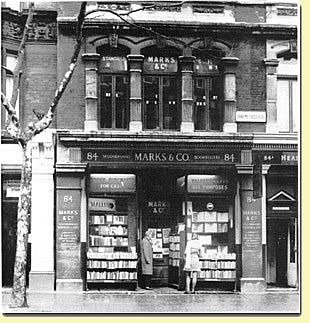 I went out for a walk to keep away from cool last Friday, and left much of my work unfinished. It took me to Charing Cross Road, and how I long for the old place — not so very old though, maybe going back ten years, when everything was still there but disappearing fast. Book buyers among you will remember Charing Cross as the street of books — old books, new books, remaindered books, over-priced antiquarian books that probably once belonged in an exalted place. The bookshop immortalised by Helene Hanff, Marks & Co. at No. 84, is now a wine bar, but further along, in another shop which is still trading in second-hand books, I once saw a piece of my memory in its window, Haji's Book of Nursery Rhymes. I wish I'd bought it, as it brought old sounds rattling back and an old cat emerged once again from an odd place. Haji's book was a strange piece of translation work of English Nursery Rhymes which our father brought home one day, and which I never found to be useful or necessary. I think we — my brothers and I — just took it as a good laugh. I still remember Ding Dong Bell, Pussy in the well... which was translated thus:
I went out for a walk to keep away from cool last Friday, and left much of my work unfinished. It took me to Charing Cross Road, and how I long for the old place — not so very old though, maybe going back ten years, when everything was still there but disappearing fast. Book buyers among you will remember Charing Cross as the street of books — old books, new books, remaindered books, over-priced antiquarian books that probably once belonged in an exalted place. The bookshop immortalised by Helene Hanff, Marks & Co. at No. 84, is now a wine bar, but further along, in another shop which is still trading in second-hand books, I once saw a piece of my memory in its window, Haji's Book of Nursery Rhymes. I wish I'd bought it, as it brought old sounds rattling back and an old cat emerged once again from an odd place. Haji's book was a strange piece of translation work of English Nursery Rhymes which our father brought home one day, and which I never found to be useful or necessary. I think we — my brothers and I — just took it as a good laugh. I still remember Ding Dong Bell, Pussy in the well... which was translated thus:
I can't remember the rest of it.
Even in this reverie it didn't escape my notice how Charing Cross road had changed. Of the old bookshops, one is now an internet cafe, and another a barber's shop. Many years ago they demolished a whole row on the west side of the road, and when a new block rose from the rubble, they filled it up with a health shop, a pizza joint, all sorts of meaningless purveyors of knick-knacks, and, mercifully, the Crime Bookshop. Now it's the turn of the East side: the Feminist Bookshop is gone, the remaindered bookshop is now full of internet browsers, while others are fighting for survival, complaining about rising rent. And then I notice that Al-Hoda, perhaps the only proper Muslim Bookshop left in the middle of town, is now an almost empty shop, with the sad abandoned look through the glass that one gets from a shop repossessed. The Al-Hoda was, at best, an unfulfilled shop run without imagination or proper rotating stock, but it was in the middle of town, and during its heyday I used to know its manager Mr Bandali who told me that rambutan was shoki-shoki in Zanzibar and even tried to convince me that the durian was an African fruit.
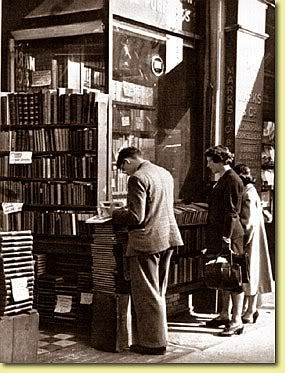 After Al-Hoda the rest will soon follow suit. Rising costs, excessive rent demands, and the loss of clientele are the main reasons. Bookshops that remain are getting bigger and more samey. They are the Waterstones and the rest that are stocked by central buying, selling books like grocery — 3 for the price of 2, pushing publishers who fail to comply with cut-price bulk-buying with extinction. I blogged some time ago about the dying second-hand book trade, something I discovered when a friend had to clear the flat of a deceased friend who left her lifetime's collection of books. Young people do not go to second-hand bookshops, he told me. Just last month I myself had to pass this on to a friend who had to clear the house of a dear friend of ours who also died and left tons of books. When his brother came from Brazil for the funeral when I was in Malaysia last July, he left instruction that I was to be the receipient of part of his brother's books. I received them last month, in ten boxes, still unopened.
After Al-Hoda the rest will soon follow suit. Rising costs, excessive rent demands, and the loss of clientele are the main reasons. Bookshops that remain are getting bigger and more samey. They are the Waterstones and the rest that are stocked by central buying, selling books like grocery — 3 for the price of 2, pushing publishers who fail to comply with cut-price bulk-buying with extinction. I blogged some time ago about the dying second-hand book trade, something I discovered when a friend had to clear the flat of a deceased friend who left her lifetime's collection of books. Young people do not go to second-hand bookshops, he told me. Just last month I myself had to pass this on to a friend who had to clear the house of a dear friend of ours who also died and left tons of books. When his brother came from Brazil for the funeral when I was in Malaysia last July, he left instruction that I was to be the receipient of part of his brother's books. I received them last month, in ten boxes, still unopened.
When I told one of those Kool Kidz at work of the bequest, the reaction from him was just as I'd expected. "Well, that sure is phat," he said.
Haji's Book Note:
I have since discovered that the Haji's Book of Nursery Rhymes, by A.W.Hamilton (with illustrations by Nora Hamilton) was published in Sydney by the Australasian Publishing Co. in 1947. The Malaysian edition was published by Donald Moore in 1956, but it reached Trengganu at an even later date.
ß
Haji's Book of the Past
Cool is the come-back of Kool without the acid. It reminds me of my trip in Bangsar a few years ago when it was introduced to me as a happening place. A happening place must indeed be cool, if little else.What happened to Kool? Well, it got old, that's what. It amuses me no end to know that Kool-Aid (which gave us Kool in the acid test as chronicled by Tom Wolfe) was laced so heavily with artificial colours that it was actually used by the breadliners to dye hair and fabric. Kool-Aid was the vehicle for dosing the unsuspecting with LSD, and the latter day cool gives much the same result. It doses the coolee with an approval rating. To be cool is to be on to something, though I don't know what, but it's good to be there, I suppose.
 I went out for a walk to keep away from cool last Friday, and left much of my work unfinished. It took me to Charing Cross Road, and how I long for the old place — not so very old though, maybe going back ten years, when everything was still there but disappearing fast. Book buyers among you will remember Charing Cross as the street of books — old books, new books, remaindered books, over-priced antiquarian books that probably once belonged in an exalted place. The bookshop immortalised by Helene Hanff, Marks & Co. at No. 84, is now a wine bar, but further along, in another shop which is still trading in second-hand books, I once saw a piece of my memory in its window, Haji's Book of Nursery Rhymes. I wish I'd bought it, as it brought old sounds rattling back and an old cat emerged once again from an odd place. Haji's book was a strange piece of translation work of English Nursery Rhymes which our father brought home one day, and which I never found to be useful or necessary. I think we — my brothers and I — just took it as a good laugh. I still remember Ding Dong Bell, Pussy in the well... which was translated thus:
I went out for a walk to keep away from cool last Friday, and left much of my work unfinished. It took me to Charing Cross Road, and how I long for the old place — not so very old though, maybe going back ten years, when everything was still there but disappearing fast. Book buyers among you will remember Charing Cross as the street of books — old books, new books, remaindered books, over-priced antiquarian books that probably once belonged in an exalted place. The bookshop immortalised by Helene Hanff, Marks & Co. at No. 84, is now a wine bar, but further along, in another shop which is still trading in second-hand books, I once saw a piece of my memory in its window, Haji's Book of Nursery Rhymes. I wish I'd bought it, as it brought old sounds rattling back and an old cat emerged once again from an odd place. Haji's book was a strange piece of translation work of English Nursery Rhymes which our father brought home one day, and which I never found to be useful or necessary. I think we — my brothers and I — just took it as a good laugh. I still remember Ding Dong Bell, Pussy in the well... which was translated thus:
Dang, dang kong,
Kucing dalam tong...
I can't remember the rest of it.
Even in this reverie it didn't escape my notice how Charing Cross road had changed. Of the old bookshops, one is now an internet cafe, and another a barber's shop. Many years ago they demolished a whole row on the west side of the road, and when a new block rose from the rubble, they filled it up with a health shop, a pizza joint, all sorts of meaningless purveyors of knick-knacks, and, mercifully, the Crime Bookshop. Now it's the turn of the East side: the Feminist Bookshop is gone, the remaindered bookshop is now full of internet browsers, while others are fighting for survival, complaining about rising rent. And then I notice that Al-Hoda, perhaps the only proper Muslim Bookshop left in the middle of town, is now an almost empty shop, with the sad abandoned look through the glass that one gets from a shop repossessed. The Al-Hoda was, at best, an unfulfilled shop run without imagination or proper rotating stock, but it was in the middle of town, and during its heyday I used to know its manager Mr Bandali who told me that rambutan was shoki-shoki in Zanzibar and even tried to convince me that the durian was an African fruit.
 After Al-Hoda the rest will soon follow suit. Rising costs, excessive rent demands, and the loss of clientele are the main reasons. Bookshops that remain are getting bigger and more samey. They are the Waterstones and the rest that are stocked by central buying, selling books like grocery — 3 for the price of 2, pushing publishers who fail to comply with cut-price bulk-buying with extinction. I blogged some time ago about the dying second-hand book trade, something I discovered when a friend had to clear the flat of a deceased friend who left her lifetime's collection of books. Young people do not go to second-hand bookshops, he told me. Just last month I myself had to pass this on to a friend who had to clear the house of a dear friend of ours who also died and left tons of books. When his brother came from Brazil for the funeral when I was in Malaysia last July, he left instruction that I was to be the receipient of part of his brother's books. I received them last month, in ten boxes, still unopened.
After Al-Hoda the rest will soon follow suit. Rising costs, excessive rent demands, and the loss of clientele are the main reasons. Bookshops that remain are getting bigger and more samey. They are the Waterstones and the rest that are stocked by central buying, selling books like grocery — 3 for the price of 2, pushing publishers who fail to comply with cut-price bulk-buying with extinction. I blogged some time ago about the dying second-hand book trade, something I discovered when a friend had to clear the flat of a deceased friend who left her lifetime's collection of books. Young people do not go to second-hand bookshops, he told me. Just last month I myself had to pass this on to a friend who had to clear the house of a dear friend of ours who also died and left tons of books. When his brother came from Brazil for the funeral when I was in Malaysia last July, he left instruction that I was to be the receipient of part of his brother's books. I received them last month, in ten boxes, still unopened.
When I told one of those Kool Kidz at work of the bequest, the reaction from him was just as I'd expected. "Well, that sure is phat," he said.
Haji's Book Note:
I have since discovered that the Haji's Book of Nursery Rhymes, by A.W.Hamilton (with illustrations by Nora Hamilton) was published in Sydney by the Australasian Publishing Co. in 1947. The Malaysian edition was published by Donald Moore in 1956, but it reached Trengganu at an even later date.
ß
Haji's Book of the Past
Saturday, November 27, 2004
Some Mother's Child II
These are pictures you don't often see in the media. The top picture shows US soldiers in a Mosque in Falluja. In the bottom picture is a dead US soldier, also in the same town. The first picture will outrage Muslims, the second will sober up those at home in those United States, who're so gung-ho for war. Perhaps that's why we don't see pictures like these very often.
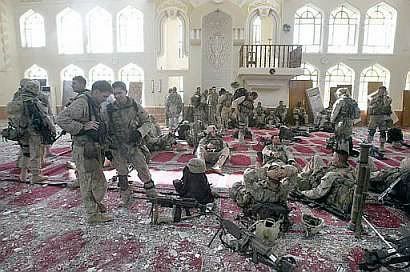
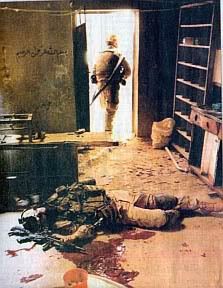
I'm grateful to fellow-blogger Raed for the above pictures.
ß
Some Mother's Child II

"We're the good guys. We are Americans. We are fighting a gentleman's war here — because we don't behead people, we don't come down to the same level of the people we're combating. That's a very difficult thing for a young 18-year-old Marine who's been trained to locate, close with and destroy the enemy with fire and close combat. That's a very difficult thing for a 42-year-old lieutenant colonel with 23 years experience in the service who was trained to do the same thing once upon a time, and who now has a thousand-plus men to lead, guide, coach, mentor -- and ensure we remain the good guys and keep the moral high ground."
— Commanding Officer, Lieutenant Colonel Willy Buhl, before the battle for Falluja began

I'm grateful to fellow-blogger Raed for the above pictures.
ß
Some Mother's Child II
Some Mother's Child

Some damsel's beau, some father's son, some mother's child...twenty-five days ago these men were alive. But now they're dead in Iraq, Falluja, Samarra, anywhere where the war on terror is raging. This is the other side of the story, this is the horror of war. When men (and women) in smart suits send their young to battle, what they don't often say is that war means death, bodies bloated and rotten, severely injured men and women being whisked in the middle of the night to military hospitals in Germany, anywhere, to be patched up, sedated, amputated. Bodies are taken out of body bags, laid in caskets, draped in flags, stored in warehouses, then taken home for burial. The world doesn't see these pictures, the media keep them under very low profile. The President of the United States hardly ever attends those funerals, except by his gung-ho ravings from afar. In fact, there is a prohibition against showing those flag-draped coffins to the American people.
Those who do, grieve silently — if they can — or they make it public, like Carlos Arredondo, who set himself on fire when told that his 20 year old son Lance Cpl. Alejandro Arredondo had been killed in Najaf. To the general public these deaths don't happen because all they see is Fox, CNN, NBC and all those other hippy-happy media that make war so much fun, about terrorists having to be flushed out, and paving the way for an election that's fair and free.
Twenty-five days ago those soldiers [above] were alive. Now they're dead soldiers mourned only by family members. Twenty five days ago scores of Iraqis were alive — never mind those insurgents — but there were ordinary Iraqis too, like 9-year old Ghaith, who took a bullet in his tummy and bled to death as his father watched him because he could not be taken to hospital while the good army were invading Falluja. And of course there was another little problem too, in their preparation for battle, the army of righteousness had destroyed hospitals, killed doctors who were going to work, and put Falluja under a cordon sanitaire.
God knows how many US soldiers have died in Iraq. Those you see above are just a selection. To see more, go to this eye-opening blogsite, Iraq in Pictures. If you believe the Iranian Commander of the Islamic Revolution Guards Corps (IRGC) Major General Rahim Safavi, the figures may have reached up to 10 percent of the US army in Iraq (14000 soldiers), if you believe the media, the figures are negligible. And God knows how many Iraqis have died. It has been said that some 2000 have perished in Falluja in these recent weeks. How many in Karbala, Samarra, Baghdad, and elsewhere? How many children dead and dying from malnutrition, radiation, starvation, and the harmless sounding death by collateral?
Do they care? War is hell, but then, in the words of St Madeline the Albright (when asked about those Iraqi children who died in Iraq), it's all been worth it.
Read:
§The Forgotten Casualties of War: Over 17,000 U.S. Troops Wounded
§Iraq Body Count
§Iraqi Civilian War Casualties
ß
Some Mother's Child
Thursday, November 25, 2004
Snail Mail
After numerous rounds of "We don't even know if Osama is still alive," Osama himself decided to send George W. a letter in his own handwriting to let him know he was still in the game.
Bush opened the letter and it appeared to contain a coded message:
370HSSV-0773H
Bush was baffled, so he e-mailed it to Colin Powell. Colin and his aides had no clue either so they sent it to the FBI. No one could solve it so it went to the CIA, and then to the NSA, then to the Secret Service. With no clue as to its meaning, they eventually asked Canada's RCMP (Royal Canadian Mounted Police) for help.
The RCMP e-mailed the White House. "Tell the President he is looking at the message upside down."
[via Seeing the Forest]
ß
Snail Mail
Bush opened the letter and it appeared to contain a coded message:
370HSSV-0773H
Bush was baffled, so he e-mailed it to Colin Powell. Colin and his aides had no clue either so they sent it to the FBI. No one could solve it so it went to the CIA, and then to the NSA, then to the Secret Service. With no clue as to its meaning, they eventually asked Canada's RCMP (Royal Canadian Mounted Police) for help.
The RCMP e-mailed the White House. "Tell the President he is looking at the message upside down."
[via Seeing the Forest]
ß
Snail Mail
Wednesday, November 24, 2004
Does Cadbury's Exist in Nature?
The colour brown is everywhere in nature, but why isn't there a word for 'brown' in Malay? If you look up a Malay dictionary you'll find that the colour brown is cokelat; even Winstedt's, that delightful repository of old Malay words, gives you chokelat in old money.
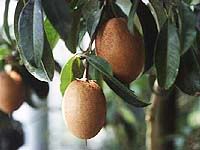 The other day I mentioned this to a friend who sprung on me the word sawo, which, he said, was used in old Malay texts to describe the skin colour of the Malays, i.e. brown. It is, he said, the colour of the ciku, one of my favourite Malaysian fruits. But then again, the ciku came to us via the Philippines, thanks to those seaborne Europeans who also brought rubber, and mentega and sepatu and almari and gereja — not all fruits, and not all sweetness and glory either. But that's another story.
The other day I mentioned this to a friend who sprung on me the word sawo, which, he said, was used in old Malay texts to describe the skin colour of the Malays, i.e. brown. It is, he said, the colour of the ciku, one of my favourite Malaysian fruits. But then again, the ciku came to us via the Philippines, thanks to those seaborne Europeans who also brought rubber, and mentega and sepatu and almari and gereja — not all fruits, and not all sweetness and glory either. But that's another story.
The Malaysian ciku (Manilkara zapota) is known by many names, of course. In the Philippines it is called Chico, in Mexico, chicle, in India, chikoo, but in Bengal, Baramasi. The Indonesians call it Sawo Manila, as do the Kelantanese, though they pronounce it Sawo Nilo, which may or may not have been a corruption of Sapodilla, another name by which the fruit is called. In Yucatan, South America, where the fruit is supposed to have originated, it is known simply as Ya. The ciku tree is of course the source of the sap chiclet, which the Yucatan Indians chewed on all day, and so do we, the world over, except in Singapura-pura.
But this still is an unsatisfactory answer. Cokelat — chocolate — may have been introduced to the East in recent times, and the ciku in the 18th century, maybe. Did Hang Tuah ever wear a brown baju, and if so, how did he describe it to his tailor? His friends may have had many names for it, but they were too polite to tell him so. It could not have been sawo for him too, could it? And cokelat is totally out of the question because of the absence of Cadbury's in old Melaka. Even today, it is still unsatisfactory for me to describe someone's hair as cokelat; and in the English language, to say that someone is chocolate coloured may not be quite PC.
When I mentioned this state of affairs to a Chinese friend, he told me that that problem exists in Chinese too.
So how shall we describe the leaves in autumn to a Malay person? The leaves are cokelat sounds too confectionery. The leaves are coloured sawo, maybe. Daun-daun itu berwarna ciku, sounds about right to me. So maybe we should put our fruit back into it and resolve the matter once and for all.
Which still leaves the question standing: why were our Malay forefathers blind to brown?
ß
Does Cadbury's Exist in Nature?
 The other day I mentioned this to a friend who sprung on me the word sawo, which, he said, was used in old Malay texts to describe the skin colour of the Malays, i.e. brown. It is, he said, the colour of the ciku, one of my favourite Malaysian fruits. But then again, the ciku came to us via the Philippines, thanks to those seaborne Europeans who also brought rubber, and mentega and sepatu and almari and gereja — not all fruits, and not all sweetness and glory either. But that's another story.
The other day I mentioned this to a friend who sprung on me the word sawo, which, he said, was used in old Malay texts to describe the skin colour of the Malays, i.e. brown. It is, he said, the colour of the ciku, one of my favourite Malaysian fruits. But then again, the ciku came to us via the Philippines, thanks to those seaborne Europeans who also brought rubber, and mentega and sepatu and almari and gereja — not all fruits, and not all sweetness and glory either. But that's another story.
The Malaysian ciku (Manilkara zapota) is known by many names, of course. In the Philippines it is called Chico, in Mexico, chicle, in India, chikoo, but in Bengal, Baramasi. The Indonesians call it Sawo Manila, as do the Kelantanese, though they pronounce it Sawo Nilo, which may or may not have been a corruption of Sapodilla, another name by which the fruit is called. In Yucatan, South America, where the fruit is supposed to have originated, it is known simply as Ya. The ciku tree is of course the source of the sap chiclet, which the Yucatan Indians chewed on all day, and so do we, the world over, except in Singapura-pura.
But this still is an unsatisfactory answer. Cokelat — chocolate — may have been introduced to the East in recent times, and the ciku in the 18th century, maybe. Did Hang Tuah ever wear a brown baju, and if so, how did he describe it to his tailor? His friends may have had many names for it, but they were too polite to tell him so. It could not have been sawo for him too, could it? And cokelat is totally out of the question because of the absence of Cadbury's in old Melaka. Even today, it is still unsatisfactory for me to describe someone's hair as cokelat; and in the English language, to say that someone is chocolate coloured may not be quite PC.
When I mentioned this state of affairs to a Chinese friend, he told me that that problem exists in Chinese too.
So how shall we describe the leaves in autumn to a Malay person? The leaves are cokelat sounds too confectionery. The leaves are coloured sawo, maybe. Daun-daun itu berwarna ciku, sounds about right to me. So maybe we should put our fruit back into it and resolve the matter once and for all.
Which still leaves the question standing: why were our Malay forefathers blind to brown?
ß
Does Cadbury's Exist in Nature?
Monday, November 22, 2004
Light On Falluja
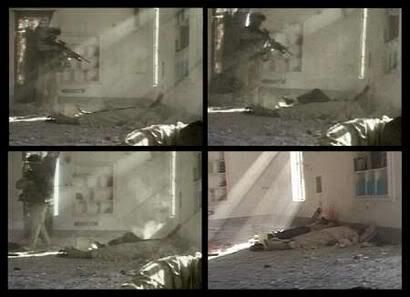
This video sequence was shot in a Mosque in Falluja on 'Eid Day, 13 November 2004. The marine with the gun was about ready to snuff out the last rays of sunlight from the prisoners lying on the floor. US televison stations showed this sequence, but blacked out the last frames, when shots were heard, because the reality was too squalid for the American public. Allawi said he did not believe that civilians died in the attack on Falluja; Rumsfeld of course said there'd be no civilian dead. So by definition everyone died an insurgent. I wrote the following on the night before 'Eid here, but in Falluja it would've been daylight...when those rays of light were entering the mosque:
They say they've shot the muezzin,
They laid him in the street to die,
They've made the city his open coffin,
And for his shroud the open sky.
§Militants control 60 per cent of Falluja §'Eid in Falluja
ß
Light On Falluja
Sunday, November 21, 2004
My Great-Great Grandpa & the General
Soon after I travelled down Thai roads [see Gone to the Birds] an irate mail arrived from, presumably, a Thai national, who berated me for being less than truthful about his/her country (his/her opinion; facts are there for all to see), asking me why being a non Thai, I was meddling in his/her country's affairs. The presumption must be that only Thais can talk about this land of the free ( which is what the name Thailand means).
Well, ChaoPraya, (for it is he/she) I disagree.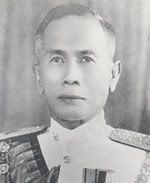 It's everybody's business if Muslims — your fellow Thais — start falling off the back of your military lorries or are found to be swimming in a funny way. Even then, it's not totally true that I have no connection with those parts. Just six generations ago, my great-great-great etc grandfather was a Mekong, a minor functionary role in Pattani, probably the official rat-catcher.
It's everybody's business if Muslims — your fellow Thais — start falling off the back of your military lorries or are found to be swimming in a funny way. Even then, it's not totally true that I have no connection with those parts. Just six generations ago, my great-great-great etc grandfather was a Mekong, a minor functionary role in Pattani, probably the official rat-catcher.
Thai Malays have been struggling against Thai hegemony since the 18th century. In the early part of the 20th century, there was the brave Malay aristocrat Tengku Abdul Kadir Kamaruddin, the last Raja of Pattani, who led many uprisings against Siamese rule. He was imprisoned and humiliated but continued his struggle when he was free again. Finally he was forced to retreat to Kelantan from where he and his men continued to do battle.
These southern Malays' distaste for Thai rule was augmented towards the middle of the last century when a fascist of a man called General Phibun Songkhram [see picture] became Prime Minister. It was he, in fact, who changed the country's name from Siam to Thailand. He passed several decrees, the most notorious of which required Thai Muslims to conform to Thai cultural norms which, in its application, saw some Muslims forced to worship the Buddha. When a rebellion against this was crushed, many southern Malays fled across the border to the Malay states of Malaya (as was). My people probably came down to Malaysia at that time, settling first in Kelantan, then Besut, then Kuala Trengganu.
Read On:
§Origins of Malay 'separatism' in Southern Thailand [pdf]
§ Facts about Thai Malay 'separatism'
ß
My Great-Great Grandpa & the General
Well, ChaoPraya, (for it is he/she) I disagree.
 It's everybody's business if Muslims — your fellow Thais — start falling off the back of your military lorries or are found to be swimming in a funny way. Even then, it's not totally true that I have no connection with those parts. Just six generations ago, my great-great-great etc grandfather was a Mekong, a minor functionary role in Pattani, probably the official rat-catcher.
It's everybody's business if Muslims — your fellow Thais — start falling off the back of your military lorries or are found to be swimming in a funny way. Even then, it's not totally true that I have no connection with those parts. Just six generations ago, my great-great-great etc grandfather was a Mekong, a minor functionary role in Pattani, probably the official rat-catcher.
Thai Malays have been struggling against Thai hegemony since the 18th century. In the early part of the 20th century, there was the brave Malay aristocrat Tengku Abdul Kadir Kamaruddin, the last Raja of Pattani, who led many uprisings against Siamese rule. He was imprisoned and humiliated but continued his struggle when he was free again. Finally he was forced to retreat to Kelantan from where he and his men continued to do battle.
These southern Malays' distaste for Thai rule was augmented towards the middle of the last century when a fascist of a man called General Phibun Songkhram [see picture] became Prime Minister. It was he, in fact, who changed the country's name from Siam to Thailand. He passed several decrees, the most notorious of which required Thai Muslims to conform to Thai cultural norms which, in its application, saw some Muslims forced to worship the Buddha. When a rebellion against this was crushed, many southern Malays fled across the border to the Malay states of Malaya (as was). My people probably came down to Malaysia at that time, settling first in Kelantan, then Besut, then Kuala Trengganu.
Read On:
§Origins of Malay 'separatism' in Southern Thailand [pdf]
§ Facts about Thai Malay 'separatism'
ß
My Great-Great Grandpa & the General
Gone to the Birds
As some of you may already know,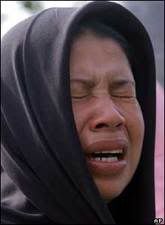 Thai roads are dangerous, and you travel there risking your life and limb. On Monday, 25th October, more than 1000 Thai Muslim protesters were loaded into military trucks in Southern Thailand, and were taken on a journey which resulted in 78 men dead on arrival. The problem arose with the Thai security force's novel technique of transporting humans as chattels: the arrested demonstrators, arms tied to their backs, were stacked up in trucks four to seven layers deep, with the surprising result — surprising to the Thai security forces that is — that at least 78 died from suffocation en route to a Thai-made hell. And I'm not making this up, but a member of the Thai security forces did on that fateful day. According to Senator Jermsak Bintong, a member of the Senate team that went down south to investigate: "They cried out for help, but the soldier told them 'Now you know what it is like in hell' " Some others who were there that day said many bodies of Southern Muslim detainees were later found in the river, hands still tied to their backs.
Thai roads are dangerous, and you travel there risking your life and limb. On Monday, 25th October, more than 1000 Thai Muslim protesters were loaded into military trucks in Southern Thailand, and were taken on a journey which resulted in 78 men dead on arrival. The problem arose with the Thai security force's novel technique of transporting humans as chattels: the arrested demonstrators, arms tied to their backs, were stacked up in trucks four to seven layers deep, with the surprising result — surprising to the Thai security forces that is — that at least 78 died from suffocation en route to a Thai-made hell. And I'm not making this up, but a member of the Thai security forces did on that fateful day. According to Senator Jermsak Bintong, a member of the Senate team that went down south to investigate: "They cried out for help, but the soldier told them 'Now you know what it is like in hell' " Some others who were there that day said many bodies of Southern Muslim detainees were later found in the river, hands still tied to their backs.
But it appears now that taking detainees on a long and uncomfortable road to hell and making them swim in the river with hands tied aren't the only strange Thai practises that have come to light. Prime Minister Thaksin Shinawatra, the man who first called those dissidents in the south 'bandits' and who was quite unperturbed by the brutality of members of his own security forces, has come up with an eccentric idea that he hopes will resolve this issue: origami.
Muslims in the South, already living under constant harrassment and fear will be pleased to know that come 5 December, 60 million paper birds, folded lovingly by Thai politicians, students, and housewives will be coming their way courtesy of the Prime Minister who launched this paper-folding campaign recently. As it is, Muslims in the south are already wary of Thai officials and members of the security forces — uniformed or in mufti — coming their way. My sources there say that many leading community members are being systematically eliminated, many murdered by unknown assailants. Now, they'll have to put up with healing by origami to comfort them at a time when many members of their community have already been brutally taken away.
Patani Note: The Malay provinces of Southern Thailand have a long history. Patani, Yala, Satun and Narathiwat are components of what was known as Patani Raya, once a Sultanate and hub of an ancient Kingdom called Langkasuka which extended to the now Malaysian states of Kelantan, Trengganu and Kedah. By force and deceit the Thais succeeded in subjugating the native population of Patani and finally annexed them into Thai imperial rule. In the early 20th century, the history of Patani was a constant struggle to be free from the yoke of Thai rule. Patani leaders were looking particularly to a reunion with their kith and kin in the northern states of Malaya which, in 1909, came under British control. This worked very well for the Thais as, from then on, the Brits were quite content to let the Thais have their way as long as they acknowledged that Kelantan, Trengganu, Kedah and Perlis were bits of the British Empire.
are components of what was known as Patani Raya, once a Sultanate and hub of an ancient Kingdom called Langkasuka which extended to the now Malaysian states of Kelantan, Trengganu and Kedah. By force and deceit the Thais succeeded in subjugating the native population of Patani and finally annexed them into Thai imperial rule. In the early 20th century, the history of Patani was a constant struggle to be free from the yoke of Thai rule. Patani leaders were looking particularly to a reunion with their kith and kin in the northern states of Malaya which, in 1909, came under British control. This worked very well for the Thais as, from then on, the Brits were quite content to let the Thais have their way as long as they acknowledged that Kelantan, Trengganu, Kedah and Perlis were bits of the British Empire.
ß
Gone to the Birds
 Thai roads are dangerous, and you travel there risking your life and limb. On Monday, 25th October, more than 1000 Thai Muslim protesters were loaded into military trucks in Southern Thailand, and were taken on a journey which resulted in 78 men dead on arrival. The problem arose with the Thai security force's novel technique of transporting humans as chattels: the arrested demonstrators, arms tied to their backs, were stacked up in trucks four to seven layers deep, with the surprising result — surprising to the Thai security forces that is — that at least 78 died from suffocation en route to a Thai-made hell. And I'm not making this up, but a member of the Thai security forces did on that fateful day. According to Senator Jermsak Bintong, a member of the Senate team that went down south to investigate: "They cried out for help, but the soldier told them 'Now you know what it is like in hell' " Some others who were there that day said many bodies of Southern Muslim detainees were later found in the river, hands still tied to their backs.
Thai roads are dangerous, and you travel there risking your life and limb. On Monday, 25th October, more than 1000 Thai Muslim protesters were loaded into military trucks in Southern Thailand, and were taken on a journey which resulted in 78 men dead on arrival. The problem arose with the Thai security force's novel technique of transporting humans as chattels: the arrested demonstrators, arms tied to their backs, were stacked up in trucks four to seven layers deep, with the surprising result — surprising to the Thai security forces that is — that at least 78 died from suffocation en route to a Thai-made hell. And I'm not making this up, but a member of the Thai security forces did on that fateful day. According to Senator Jermsak Bintong, a member of the Senate team that went down south to investigate: "They cried out for help, but the soldier told them 'Now you know what it is like in hell' " Some others who were there that day said many bodies of Southern Muslim detainees were later found in the river, hands still tied to their backs.
But it appears now that taking detainees on a long and uncomfortable road to hell and making them swim in the river with hands tied aren't the only strange Thai practises that have come to light. Prime Minister Thaksin Shinawatra, the man who first called those dissidents in the south 'bandits' and who was quite unperturbed by the brutality of members of his own security forces, has come up with an eccentric idea that he hopes will resolve this issue: origami.
Muslims in the South, already living under constant harrassment and fear will be pleased to know that come 5 December, 60 million paper birds, folded lovingly by Thai politicians, students, and housewives will be coming their way courtesy of the Prime Minister who launched this paper-folding campaign recently. As it is, Muslims in the south are already wary of Thai officials and members of the security forces — uniformed or in mufti — coming their way. My sources there say that many leading community members are being systematically eliminated, many murdered by unknown assailants. Now, they'll have to put up with healing by origami to comfort them at a time when many members of their community have already been brutally taken away.
Patani Note: The Malay provinces of Southern Thailand have a long history. Patani, Yala, Satun and Narathiwat
 are components of what was known as Patani Raya, once a Sultanate and hub of an ancient Kingdom called Langkasuka which extended to the now Malaysian states of Kelantan, Trengganu and Kedah. By force and deceit the Thais succeeded in subjugating the native population of Patani and finally annexed them into Thai imperial rule. In the early 20th century, the history of Patani was a constant struggle to be free from the yoke of Thai rule. Patani leaders were looking particularly to a reunion with their kith and kin in the northern states of Malaya which, in 1909, came under British control. This worked very well for the Thais as, from then on, the Brits were quite content to let the Thais have their way as long as they acknowledged that Kelantan, Trengganu, Kedah and Perlis were bits of the British Empire.
are components of what was known as Patani Raya, once a Sultanate and hub of an ancient Kingdom called Langkasuka which extended to the now Malaysian states of Kelantan, Trengganu and Kedah. By force and deceit the Thais succeeded in subjugating the native population of Patani and finally annexed them into Thai imperial rule. In the early 20th century, the history of Patani was a constant struggle to be free from the yoke of Thai rule. Patani leaders were looking particularly to a reunion with their kith and kin in the northern states of Malaya which, in 1909, came under British control. This worked very well for the Thais as, from then on, the Brits were quite content to let the Thais have their way as long as they acknowledged that Kelantan, Trengganu, Kedah and Perlis were bits of the British Empire.
ß
Gone to the Birds
Sunday, November 14, 2004
Growing Up in Trengganu #435926
'Eid day or Hari Raya would suddenly come with the pealing of the genta — the big brass Trengganu bell on the hill overlooking the harbour — a sudden shift of tone in the Masjid 'Abidin, from tarawih prayers to the takbeer, then perhaps an announcement on the radio. We had a radio with a lit up dial  that carried the names of many cities of the world. A long needle travelled across its face to pick voices that came from distant parts — New Delhi, Ljubljana, Moscow, Warsaw, probably even Gdansk and Timbuctoo. From each stop came sounds like voices of ghosts from afar, but mostly they were just the high-pitched gurglings pouring out across the ether.
that carried the names of many cities of the world. A long needle travelled across its face to pick voices that came from distant parts — New Delhi, Ljubljana, Moscow, Warsaw, probably even Gdansk and Timbuctoo. From each stop came sounds like voices of ghosts from afar, but mostly they were just the high-pitched gurglings pouring out across the ether.
Radio Malaysia was the clearest of all, and if the Hari Raya announcement did come on the radio, it would have been based on a sighting of the birth of Shawwal from Teluk Kemang, which was the best place for sighting the burgeoning moon.
But Teluk Kemang and the radio notwithstanding, Hari Raya came in those days much like the rain in those fabled reports on the Malaysian weather. The Trengganu genta may have pealed and clanged so ecstatically for 'Eid, but there'd probably be a state or two that'd be holding on to Ramadhan tenaciously, and push back 'Eid for another day. Hari Raya sometimes came like that — like the rain in those Malaysian weather reports — falling only here and there.
Soon as the news settled in, Mother would hasten to the kitchen to boil a huge pot of rice which she'd leave aside to cool awhile. Then when she'd done all her other work, she'd wrap it in banana leaves, and again in an outer layer of cloth; and then she'd call out to us to come to the kitchen to help her lift the heavy slab of grinding stone — batu giling — which she'd place atop the parcel. And there it'd stay till 'Eid morning when a miracle would unravel before our eyes. Carefully she'd unwrap the rice that had compacted overnight into a huge slab of cake, and cut it into little cubes to eat with her peanut sauce. This was the nasi himpit, or the nasi kapit as we knew it in Trengganu.
The nasi kapit was de rigueur for Hari Raya, as was the ketupat pulut, glutinous rice wrapped in triangle shaped packets of palas leaves, then fried in coconut oil. There was also another ketupat wrapped in little parcels woven from the long shoots of the coconut tree. This was another way of making the nasi kapit,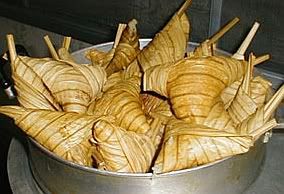 but instead of resting the cooked rice overnight under a massive slab, raw rice was poured into the woven containers, then sealed and boiled in a pot until the rice fluffed out and pressed itself into a cake under the pressure.
but instead of resting the cooked rice overnight under a massive slab, raw rice was poured into the woven containers, then sealed and boiled in a pot until the rice fluffed out and pressed itself into a cake under the pressure.
It was the surprise Hari Raya that made it for us, the surprise arrival of a joyous day. But even so, preparations for it would've been made throughout Ramadhan. Cakes were ordered from the specialist makers: putu kacang or the apit-apit made from flour mixed with stuff, then thrown onto a flat, hot round pan, then rolled again when slightly browned and pliant, into cigar shapes with a hole running down the centre. We used them as edible straws for drinking hot Milo. Rokok Arab was my favourite treat, ordered from Mak Nah who lived behind the walls of the palace or istana. Rokok Arab was apit-apit with College education; it was rolled like a cigar and solid like a stick, not hollow like the apit-apit straw. It was greased with Trengganu ghee — our minyak sapi — smothered in Mak Nah's devotion and love, then fried to the right consistency as required to transport a child to another world.
Around mid Ramadhan mother would lay down her ingredients of long pandanus leaves, sugar and agar-agar, magical dyes in little bottles, and the merest hint of essence vanilla. She'd throw them all into a thick brass pot over a wood fire then stir and stir till the agar-agar and the mixture was transformed into the sweetest smelling goo which she poured into a tray with rims about an inch high. Then she'd start again with the same ingredients, but another colour. After iftar and her dusk prayer she'd sit on the floor beside her trays of congealed colours, to cut out crinkly edged, diamond shaped beleda which she'd arrange again into neat rows on many trays.
The task was set for father for the following blazing Trengganu day. He'd reach out of the window and place the trays one by one to dry in the sun on the only slightly sloping roof of the surau next door. The sun-dried beleda were the tones of our celebration: sugar-coated shapes of green and red and golden yellow, shining translucently like stained-glass on our Hari Raya.
ß
Growing Up in Trengganu #435926
 that carried the names of many cities of the world. A long needle travelled across its face to pick voices that came from distant parts — New Delhi, Ljubljana, Moscow, Warsaw, probably even Gdansk and Timbuctoo. From each stop came sounds like voices of ghosts from afar, but mostly they were just the high-pitched gurglings pouring out across the ether.
that carried the names of many cities of the world. A long needle travelled across its face to pick voices that came from distant parts — New Delhi, Ljubljana, Moscow, Warsaw, probably even Gdansk and Timbuctoo. From each stop came sounds like voices of ghosts from afar, but mostly they were just the high-pitched gurglings pouring out across the ether.
Radio Malaysia was the clearest of all, and if the Hari Raya announcement did come on the radio, it would have been based on a sighting of the birth of Shawwal from Teluk Kemang, which was the best place for sighting the burgeoning moon.
But Teluk Kemang and the radio notwithstanding, Hari Raya came in those days much like the rain in those fabled reports on the Malaysian weather. The Trengganu genta may have pealed and clanged so ecstatically for 'Eid, but there'd probably be a state or two that'd be holding on to Ramadhan tenaciously, and push back 'Eid for another day. Hari Raya sometimes came like that — like the rain in those Malaysian weather reports — falling only here and there.
Soon as the news settled in, Mother would hasten to the kitchen to boil a huge pot of rice which she'd leave aside to cool awhile. Then when she'd done all her other work, she'd wrap it in banana leaves, and again in an outer layer of cloth; and then she'd call out to us to come to the kitchen to help her lift the heavy slab of grinding stone — batu giling — which she'd place atop the parcel. And there it'd stay till 'Eid morning when a miracle would unravel before our eyes. Carefully she'd unwrap the rice that had compacted overnight into a huge slab of cake, and cut it into little cubes to eat with her peanut sauce. This was the nasi himpit, or the nasi kapit as we knew it in Trengganu.
The nasi kapit was de rigueur for Hari Raya, as was the ketupat pulut, glutinous rice wrapped in triangle shaped packets of palas leaves, then fried in coconut oil. There was also another ketupat wrapped in little parcels woven from the long shoots of the coconut tree. This was another way of making the nasi kapit,
 but instead of resting the cooked rice overnight under a massive slab, raw rice was poured into the woven containers, then sealed and boiled in a pot until the rice fluffed out and pressed itself into a cake under the pressure.
but instead of resting the cooked rice overnight under a massive slab, raw rice was poured into the woven containers, then sealed and boiled in a pot until the rice fluffed out and pressed itself into a cake under the pressure.
It was the surprise Hari Raya that made it for us, the surprise arrival of a joyous day. But even so, preparations for it would've been made throughout Ramadhan. Cakes were ordered from the specialist makers: putu kacang or the apit-apit made from flour mixed with stuff, then thrown onto a flat, hot round pan, then rolled again when slightly browned and pliant, into cigar shapes with a hole running down the centre. We used them as edible straws for drinking hot Milo. Rokok Arab was my favourite treat, ordered from Mak Nah who lived behind the walls of the palace or istana. Rokok Arab was apit-apit with College education; it was rolled like a cigar and solid like a stick, not hollow like the apit-apit straw. It was greased with Trengganu ghee — our minyak sapi — smothered in Mak Nah's devotion and love, then fried to the right consistency as required to transport a child to another world.
Around mid Ramadhan mother would lay down her ingredients of long pandanus leaves, sugar and agar-agar, magical dyes in little bottles, and the merest hint of essence vanilla. She'd throw them all into a thick brass pot over a wood fire then stir and stir till the agar-agar and the mixture was transformed into the sweetest smelling goo which she poured into a tray with rims about an inch high. Then she'd start again with the same ingredients, but another colour. After iftar and her dusk prayer she'd sit on the floor beside her trays of congealed colours, to cut out crinkly edged, diamond shaped beleda which she'd arrange again into neat rows on many trays.
The task was set for father for the following blazing Trengganu day. He'd reach out of the window and place the trays one by one to dry in the sun on the only slightly sloping roof of the surau next door. The sun-dried beleda were the tones of our celebration: sugar-coated shapes of green and red and golden yellow, shining translucently like stained-glass on our Hari Raya.
ß
Growing Up in Trengganu #435926
Saturday, November 13, 2004
To One and All...
Kullu 'aamin waantum bikhair.
ß
To One and All...
Friday, November 12, 2004
Farewell Arafat

Mohammed Abder Rauf Arafat al-Kudwa al-Husseini
1929 - 2004
They've said all they need to say about him. I put him here now because I like the picture. It says it all. But he did say that his hope was that someday some little children will fly the flag of Palestine from the Mosques and Churches of a free Palestine.
Thanks, AquaCool, for the picture.
ß
Farewell Arafat
Eid In Falluja
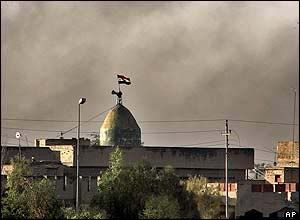
Sabah ya Falluja, khairaan ma'aak
Al-Fajr is coming down with a glow,
Your city is lit in your ghostly flak,
'Eid is here lest you didn't know.
O Mothers of Falluja wiping your tears
Will you walk these streets again?
Your voice, your hopes and silent prayers,
Your anguish the voice of Falluja's pain.
O Gaith my son, O Gaith is dead,
For nine short years, my only joy,
In Falluja's earth your bed is made
You're still only a little boy.
They say they've shot the muezzin,
They laid him in the street to die,
They've made the city his open coffin,
And for his shroud the open sky.
Falluja is alight this blessed 'Eid,
So Iraq shines in its deathly glow,
Falluja like Grozny in ashes they buried,
They hope to rise from Falluja's sorrow.
— 1 Shawwal, 1425
ß
Eid In Falluja
Wednesday, November 10, 2004
Two Weddings and a Few Dinars
I'm reproducing this letter which I received today because of its refreshing novelty. This one's got everything: love (twice), sex (ditto), violence, bad spelling, beard (the late Mullah), religion, ecumenism, and a very grim prognosis. And of course, the dead man's wife's chest (wherein, plenty of money):
DEAR SIR,
GREETING IN THE NAME OF OUR LORD JESUS CHRIST AND IN THE NAME OF ALLAH THE EVEREFICIENT AND THE MERCYFUL.. I AM MRS NORA JUBRIL, NOW MRS SABRINA EDWARD, A WIDOW TO LATE SHEIKH IBRAHAM. I AM NOW A NEW CHRISTAIN CONVERT, SUFFERING FROM LONG TIME CANCER OF THE BREAST, FROM ALL INDICATION MY CONDITIONS IS REALLY DETERIORATING AND IT IS QUITE OBVIOUS THAT I WON'T LIVE MORE,ACCORDING TO MY DOCTORS, THIS IS BECAUSE THE CANCER STAGE HAS GOTTEN TO A VERY BAD STAGE.
MY LATE HUSBAND WAS KILLED DURING THE U.S. RAID AGAINST TERRORISM IN IRAQ, AND DURING THE PERIOD OF OUR MARRIAGE WE COULD NOT PRODUCE ANY CHILD. MY LATE HUSBAND WAS VERY WEALTHY AND AFTER HIS DEATH, I INHERITED ALL HIS WEALTH. THE DOCTORS HAS ADVISED ME THAT I MAY NOT LIVE LONG SO I NOW DECIDED TO DEVIDE THE PART OF THIS WEALTH TO CONTRIBUTE TO THE DEVELOPMENT OF THE CHURCH AND MOSQUE IN AFRICA, AMERICA, ASIA, AND EUROPE.
I SELECTED YOU AFTER VISITING THE WEBSITE AND I PRAYED OVER IT, I AM WILLING TO DONATE THE SUM OF $7.5 MILLION UNITED STATES DOLLARS, TO THE LESS PRIVILEGED. PLEASE I WANT YOU TO NOTE THAT THIS FUND IS LYING IN A SECURITY COMPANY AND UPON MY INSTRUCTION, MY LEGAL ADVICER, WILL FILE IN AN APPLICATION FOR THE TRANSFER OF THE MONEY IN YOUR NAME.
LASTLY, I HONESTLY PRAY THAT THIS MONEY WHEN TRANSFERRED WILL BE SURE FOR THE SAID PURPOSE, BECAUSE I HAVE COME TO FIND OUT THAT WEALTH ACQUISITION WITHOUT CHRIST AND ALLAH IS VANITY. MAY THE GRACE OF OUR LORD JESUS THE LOVE OF GOD AND THE FELLOWSHIP OF GOD BE WITH YOU AND YOUR FAMILY. AND MAY ALLAH BLESS AND BE WITH MY MUSLEM BRETHRENS BECAUSE I KNOW GOD IS ONE. I AWAIT URGENT REPLY THROUGH THIS EMAIL ADDRESS sabbxxxx@xxxx.ca
YOURS IN THE NAME OF GOD.
MRS SABRINA EDWARD
ß
Two Weddings and a Few Dinars
DEAR SIR,
GREETING IN THE NAME OF OUR LORD JESUS CHRIST AND IN THE NAME OF ALLAH THE EVEREFICIENT AND THE MERCYFUL.. I AM MRS NORA JUBRIL, NOW MRS SABRINA EDWARD, A WIDOW TO LATE SHEIKH IBRAHAM. I AM NOW A NEW CHRISTAIN CONVERT, SUFFERING FROM LONG TIME CANCER OF THE BREAST, FROM ALL INDICATION MY CONDITIONS IS REALLY DETERIORATING AND IT IS QUITE OBVIOUS THAT I WON'T LIVE MORE,ACCORDING TO MY DOCTORS, THIS IS BECAUSE THE CANCER STAGE HAS GOTTEN TO A VERY BAD STAGE.
MY LATE HUSBAND WAS KILLED DURING THE U.S. RAID AGAINST TERRORISM IN IRAQ, AND DURING THE PERIOD OF OUR MARRIAGE WE COULD NOT PRODUCE ANY CHILD. MY LATE HUSBAND WAS VERY WEALTHY AND AFTER HIS DEATH, I INHERITED ALL HIS WEALTH. THE DOCTORS HAS ADVISED ME THAT I MAY NOT LIVE LONG SO I NOW DECIDED TO DEVIDE THE PART OF THIS WEALTH TO CONTRIBUTE TO THE DEVELOPMENT OF THE CHURCH AND MOSQUE IN AFRICA, AMERICA, ASIA, AND EUROPE.
I SELECTED YOU AFTER VISITING THE WEBSITE AND I PRAYED OVER IT, I AM WILLING TO DONATE THE SUM OF $7.5 MILLION UNITED STATES DOLLARS, TO THE LESS PRIVILEGED. PLEASE I WANT YOU TO NOTE THAT THIS FUND IS LYING IN A SECURITY COMPANY AND UPON MY INSTRUCTION, MY LEGAL ADVICER, WILL FILE IN AN APPLICATION FOR THE TRANSFER OF THE MONEY IN YOUR NAME.
LASTLY, I HONESTLY PRAY THAT THIS MONEY WHEN TRANSFERRED WILL BE SURE FOR THE SAID PURPOSE, BECAUSE I HAVE COME TO FIND OUT THAT WEALTH ACQUISITION WITHOUT CHRIST AND ALLAH IS VANITY. MAY THE GRACE OF OUR LORD JESUS THE LOVE OF GOD AND THE FELLOWSHIP OF GOD BE WITH YOU AND YOUR FAMILY. AND MAY ALLAH BLESS AND BE WITH MY MUSLEM BRETHRENS BECAUSE I KNOW GOD IS ONE. I AWAIT URGENT REPLY THROUGH THIS EMAIL ADDRESS sabbxxxx@xxxx.ca
YOURS IN THE NAME OF GOD.
MRS SABRINA EDWARD
ß
Two Weddings and a Few Dinars
Monday, November 08, 2004
Road to Jerusalem
Every year in Ramadhan the man from Aleppo invites me to iftar. He feeds us always the same fare — and I'm not complaining because it's the iftar that I look forward to each year — ayran overflowing, plates of kofta, bhamia in red sauce, chorba, rice cooked with the merest hint of oil, and to top it all, kata'if, the cheese-filled samosa fried then coated in thin syrup.
But there's something else there too that gladdens my heart and saddens me so. At the table, among the regulars from that troubled part of the world, is a youthful senior person whom I greatly admire. His parents, he says, were custodians of an old Waqf in his birthplace, but the British came and took the keys, then another bunch of colonialists came and took them away forever.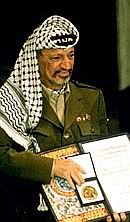 He was born in Jerusalem some eighty years ago, and is still a sprightly old soul. He sat with us for tarawih through the Ramadhan of 2002, and remembered many verses when the Imam stumbled, this man of excellent memory — a hafiz unsurprisingly — of excellent health, and good cheer. Yet each year I meet him and bid him farewell with great sadness because I know what he longs for and I know that come the day, he will not be laid in his native soil.
He was born in Jerusalem some eighty years ago, and is still a sprightly old soul. He sat with us for tarawih through the Ramadhan of 2002, and remembered many verses when the Imam stumbled, this man of excellent memory — a hafiz unsurprisingly — of excellent health, and good cheer. Yet each year I meet him and bid him farewell with great sadness because I know what he longs for and I know that come the day, he will not be laid in his native soil.
I think of him when I see Arafat taken to hospital, kissing the air bravely and wearing a hat that keeps slipping off his head. This may be the end of the road for this much-maligned man, and it now looks like he too will be denied a place of repose in the Jerusalem of his birth. The denigration has already started of course, his sickness, his life of terrorism, then the denial of a resting place. The cockiness is breath-taking: Jerusalem, so the official line goes, is the burial place of Jewish Kings and officials and not for terrorists like Arafat; never mind that that arch-conman and pension fund raider Robert Maxwell was also buried there with pomp and ceremony. And as for terrorists being laid down there, well, let Begin and Shamir be disinterred.
Such is the apartheid practise in this Zionist state that even in death you're still an outcast because it's an exclusive land for one people.
Someone has said it though, that Arafat will die on a Jewish holiday. Any day that Arafat dies is a Jewish holiday. Death is neither selective nor surprising, it comes to all of us, but why is Arafat maligned so?
Well, it helps if he's seen as a figure of hate. It distracts attention from the other side. It also makes the marginalising of Palestinians even easier. Talk to them? Why, they must democratise, give up armed violence, get rid of their corrupt leader. Yet, it's conveniently forgotten that Arafat is the chosen leader — he was elected chairman of the PLO and President of the Palestinian authority. And there's violence among Palestinians of course, try stopping oppressed people expressing themselves, and how is Arafat responsible for that? What about the oppressors?
It's the much vaunted 'truth' that the Zionists have given much and the Palestinians, very little. This has been repeatedly said in the media, like a mantra, that they too now believe that it is so. So before he goes, let's think this of Yaseer Arafat: he bravely opted for a two-state solution which means that a huge chunk of Palestinian land is given away; he urged compromise on his people (nobody else could have done that); he, more than Barak or Sharon, was the architect of the Oslo accords (Barak and Sharon rejected it in the Knesset).
And most of all, Arafat single-handedly made Palestine a by-word, a potential state, a people. All those Zionists — think of that famous remark by Golda Meir — deny that Palestine exists. And then those tetchy issues: Jerusalem and the right of return. On these Arafat refused to budge, and why should he, he has given a lot already. And that makes him a terrorist.
Arafat may not have been perfect — and Sharon's a mass murderer — but give the man his due. He deserves better.
§Was Arafat Poisoned?
ß
Road to Jerusalem
But there's something else there too that gladdens my heart and saddens me so. At the table, among the regulars from that troubled part of the world, is a youthful senior person whom I greatly admire. His parents, he says, were custodians of an old Waqf in his birthplace, but the British came and took the keys, then another bunch of colonialists came and took them away forever.
 He was born in Jerusalem some eighty years ago, and is still a sprightly old soul. He sat with us for tarawih through the Ramadhan of 2002, and remembered many verses when the Imam stumbled, this man of excellent memory — a hafiz unsurprisingly — of excellent health, and good cheer. Yet each year I meet him and bid him farewell with great sadness because I know what he longs for and I know that come the day, he will not be laid in his native soil.
He was born in Jerusalem some eighty years ago, and is still a sprightly old soul. He sat with us for tarawih through the Ramadhan of 2002, and remembered many verses when the Imam stumbled, this man of excellent memory — a hafiz unsurprisingly — of excellent health, and good cheer. Yet each year I meet him and bid him farewell with great sadness because I know what he longs for and I know that come the day, he will not be laid in his native soil.
I think of him when I see Arafat taken to hospital, kissing the air bravely and wearing a hat that keeps slipping off his head. This may be the end of the road for this much-maligned man, and it now looks like he too will be denied a place of repose in the Jerusalem of his birth. The denigration has already started of course, his sickness, his life of terrorism, then the denial of a resting place. The cockiness is breath-taking: Jerusalem, so the official line goes, is the burial place of Jewish Kings and officials and not for terrorists like Arafat; never mind that that arch-conman and pension fund raider Robert Maxwell was also buried there with pomp and ceremony. And as for terrorists being laid down there, well, let Begin and Shamir be disinterred.
Such is the apartheid practise in this Zionist state that even in death you're still an outcast because it's an exclusive land for one people.
Someone has said it though, that Arafat will die on a Jewish holiday. Any day that Arafat dies is a Jewish holiday. Death is neither selective nor surprising, it comes to all of us, but why is Arafat maligned so?
Well, it helps if he's seen as a figure of hate. It distracts attention from the other side. It also makes the marginalising of Palestinians even easier. Talk to them? Why, they must democratise, give up armed violence, get rid of their corrupt leader. Yet, it's conveniently forgotten that Arafat is the chosen leader — he was elected chairman of the PLO and President of the Palestinian authority. And there's violence among Palestinians of course, try stopping oppressed people expressing themselves, and how is Arafat responsible for that? What about the oppressors?
It's the much vaunted 'truth' that the Zionists have given much and the Palestinians, very little. This has been repeatedly said in the media, like a mantra, that they too now believe that it is so. So before he goes, let's think this of Yaseer Arafat: he bravely opted for a two-state solution which means that a huge chunk of Palestinian land is given away; he urged compromise on his people (nobody else could have done that); he, more than Barak or Sharon, was the architect of the Oslo accords (Barak and Sharon rejected it in the Knesset).
And most of all, Arafat single-handedly made Palestine a by-word, a potential state, a people. All those Zionists — think of that famous remark by Golda Meir — deny that Palestine exists. And then those tetchy issues: Jerusalem and the right of return. On these Arafat refused to budge, and why should he, he has given a lot already. And that makes him a terrorist.
Arafat may not have been perfect — and Sharon's a mass murderer — but give the man his due. He deserves better.
§Was Arafat Poisoned?
ß
Road to Jerusalem
Sunday, November 07, 2004
Raya in Trengganu
The following was written yesterday as I was travelling to work on the Central Line. I meant it to be a special Raya message to a much admired fellow blogger and Trengganu man. He came back saying "You should put it on your blog." Well, here it is then, dah nak wat guane? ["Whattudu?"] My Raya wishes to you too; hope you enjoy it, dear reader, if you can:
Translation later.
ß
Raya in Trengganu
Bangung Awang, bangung Mek
Esok dah Hari Raya,
Mok mung dok ssolek,
Pok mung puko geta,
Gi paka baju mmolek,
Kita gi rumoh Cik We,
Kalu mung panda kkecek,
Dapat pitis seria dua.
Kita gi semejid putih,
Bila mung mandi manda,
Ambek basika mung gateh,
Gi pulok rumah Tok Da,
Mung ciung tangang Pak Mut,
Jangang ciung anok dia,
Memang dia putih seleput,
Aku tengok pong naik seria.
Lepah tu gilah dderat,
Semua rumoh kawang-kawang,
Tapi jangang lama sangat,
Sapa tua ttengoh jalang,
Ingat dak tahung lalu,
Hari Raya panah ddering,
Mung tunggu derumoh Pok Ku,
Bbawah rang ikang kering.
Mu tekang loceng ppitu,
Kelor sapa habih reng,
Tunggu sapa puko satu,
Dok ssorang koteng-koteng,
Ppeluh nnelleh mung kesat,
Lama-lama naik bingung,
Rupanya Pok Ku tembor lesat,
Naik bas gi Teganung!
Dah sebulang kita perosa,
Perut pong lapor belepeng,
Dah Raya ni barulah rasa,
Perut se'eh nak jerenggeng,
Ambe mitok maaflah ya,
Ggura seloroh, ggitu ggining,
Ucak Selamak Hari Raya,
Ma'af zahir dang bateng.
— beta-blogger
Translation later.
ß
Raya in Trengganu
Thursday, November 04, 2004
Gospel With A Bite

A Taipei man trying to convert a lion to Christianity was bitten in the leg.
"Jesus will save you, ouch! ouch! ouch!" the man said.
Zoo workers used water hoses and tranquilisier guns to rescue the zoovangelical worker.
Source: MSNBC News
ß
Gospel With A Bite
Wednesday, November 03, 2004
Growing Up in Trengganu #93756
One day one of our neighbours went to the circus and came back with a man. There was all talk and excitement in the neighbourhood as this was no ordinary man in leotards doing tricks on a trapeeze that she got hitched to, but someone from Circo Brasil, a country which most of us hadn't known.  We've had many circuses come to town those days, but they were mostly manned by folks from further East, and I hated all of them as circuses weren't my favourite pastime, and all those motor-cycling up and down in a rounded cage and animals doing things at the leg-end of an upturned chair were just irritating distractions that adults insisted in foisting on us. I hated most the clowns, who were just sad, painted men.
We've had many circuses come to town those days, but they were mostly manned by folks from further East, and I hated all of them as circuses weren't my favourite pastime, and all those motor-cycling up and down in a rounded cage and animals doing things at the leg-end of an upturned chair were just irritating distractions that adults insisted in foisting on us. I hated most the clowns, who were just sad, painted men.
But the Circo Brasil man changed all that for, besides my cousin who married an Egyptian, not many from our community were paired up with anyone else from across the oceans. We knew that Brazil was a faraway place and that marriages were made in heaven, but how was she to speak to him and what if he drank our budu neat, thinking it to be a drink? Those were questions that bothered us when we heard about our neighbour's impending marriage. I soon became interested in Circuses and all that went on beneath the tents.
Circuses came to town during the holiday season in those days, so someone in Brazil must've been keeping a close watch on the time-table for our school terms, just as turtles from beyond knew to swim our shores in August, as August was the month when everyone in Rantau Abang stayed up all night to look for them. That was how things worked in Trengganu then, according to motions and time: just when the shopkeepers raised their stocks in algae green paper umbrellas, the December monsoons would come a-lashing down, and it'd rain for weeks and weeks on end.
It rained on us too in our hot enthusiasm for the Brazillian man for, when our neighbour took him home, he turned out to be no Brazillian but a man from Batu Gajah perhaps, and Batu Gajah was just over the hill from us, not across the wide ocean. So we just let them get on with their married life, and the Circus too did the same, for, when they upped tents and headed out of town, our bridegroom from Circo Brasil became a Kuala Trengganu townsman.
Our Brazillian let-down notwithstanding we had quite a cosmopolitan crowd in our town even then. There were folk from over the hills whom we called the orang luar or outsiders who soon became very much like us local folk, eating ikang and walking the jalang. We had Pak Loh Yunang the booksellers, of course, Muslims from the province of Yunnan in China, but they soon adopted our ways right down to the batik sarong. There were of course the local Chinese who'd been in Trengganu more than a hundreed years, and whose best expression to me was Pak Awang.
Pak Awang was a necromancer with a silver tongue who'd walk the streets in his Chinese trousers, and in his hands, a green umbrella and his office-in-a-bag. He spoke Trengganuspeak like a native, and so he was, and appeared most afternoons at Wan Mamat's and spoke and spoke while the kerepoks boiled in the cauldron. Wan Mamat was one of two kerepok makers in our part of town. Each day, after the sound of the late afternoon geduk — the call-to-prayer drum — the fish would arrive in basket loads and Wan Mamat would supervise his wife and daughters in the cleaning of them while he continued to speak on various subjects to Pak Awang. Once I overheard them talk about the dark business of spirits, and Pak Awang, who was also a ghostbuster necromancerman, confided in him that spirits were put off by the bones of pigs, so whenever he did a spot of exorcism he'd prod his patients — some of whom were Muslims — with this handy object which he always carried in his little bag. "Lepah tu aku samoklah pulok,*" he told Wan Mamat who was reassured.
Each day, after the sound of the late afternoon geduk — the call-to-prayer drum — the fish would arrive in basket loads and Wan Mamat would supervise his wife and daughters in the cleaning of them while he continued to speak on various subjects to Pak Awang. Once I overheard them talk about the dark business of spirits, and Pak Awang, who was also a ghostbuster necromancerman, confided in him that spirits were put off by the bones of pigs, so whenever he did a spot of exorcism he'd prod his patients — some of whom were Muslims — with this handy object which he always carried in his little bag. "Lepah tu aku samoklah pulok,*" he told Wan Mamat who was reassured.
Soon as the kerepok was off the boil and placed in round woven baskets — hence lekor, Trengganuspeak for lingkar, the curling of long kerepoks in a round basket — Pak Awang would take his order and head home to his wife Mak Mek who was a keropok lekor reseller behind a bookshop in Chinatown.
In front of our house were Tamil shopkeepers, who were spice retailers and textile merchants, some hailing from a place called Mappilaikuppam in Nanilam, in the Tanjore district of Southern India. I know because some days I'd be diverted from my walk home from school by some of them who wanted to have addresses written on their envelopes of despatches and postal orders to their native village in Mother India. On Friday, the state holiday, a Nanilam man living in his shop in front of our house would pull out his harmonium and sing his mournful tunes to the empty market.
We could've had a Brazillian man pull out his Friday instrument to put a little Samba in our midst; but then as it turned out, he wasn't and he didn't, and he turned out to be just one of us.
--------------
*"I do the [Muslim] ritual cleansing afterwards, of course."
ß
Growing Up in Trengganu #93756
 We've had many circuses come to town those days, but they were mostly manned by folks from further East, and I hated all of them as circuses weren't my favourite pastime, and all those motor-cycling up and down in a rounded cage and animals doing things at the leg-end of an upturned chair were just irritating distractions that adults insisted in foisting on us. I hated most the clowns, who were just sad, painted men.
We've had many circuses come to town those days, but they were mostly manned by folks from further East, and I hated all of them as circuses weren't my favourite pastime, and all those motor-cycling up and down in a rounded cage and animals doing things at the leg-end of an upturned chair were just irritating distractions that adults insisted in foisting on us. I hated most the clowns, who were just sad, painted men.
But the Circo Brasil man changed all that for, besides my cousin who married an Egyptian, not many from our community were paired up with anyone else from across the oceans. We knew that Brazil was a faraway place and that marriages were made in heaven, but how was she to speak to him and what if he drank our budu neat, thinking it to be a drink? Those were questions that bothered us when we heard about our neighbour's impending marriage. I soon became interested in Circuses and all that went on beneath the tents.
Circuses came to town during the holiday season in those days, so someone in Brazil must've been keeping a close watch on the time-table for our school terms, just as turtles from beyond knew to swim our shores in August, as August was the month when everyone in Rantau Abang stayed up all night to look for them. That was how things worked in Trengganu then, according to motions and time: just when the shopkeepers raised their stocks in algae green paper umbrellas, the December monsoons would come a-lashing down, and it'd rain for weeks and weeks on end.
It rained on us too in our hot enthusiasm for the Brazillian man for, when our neighbour took him home, he turned out to be no Brazillian but a man from Batu Gajah perhaps, and Batu Gajah was just over the hill from us, not across the wide ocean. So we just let them get on with their married life, and the Circus too did the same, for, when they upped tents and headed out of town, our bridegroom from Circo Brasil became a Kuala Trengganu townsman.
Our Brazillian let-down notwithstanding we had quite a cosmopolitan crowd in our town even then. There were folk from over the hills whom we called the orang luar or outsiders who soon became very much like us local folk, eating ikang and walking the jalang. We had Pak Loh Yunang the booksellers, of course, Muslims from the province of Yunnan in China, but they soon adopted our ways right down to the batik sarong. There were of course the local Chinese who'd been in Trengganu more than a hundreed years, and whose best expression to me was Pak Awang.
Pak Awang was a necromancer with a silver tongue who'd walk the streets in his Chinese trousers, and in his hands, a green umbrella and his office-in-a-bag. He spoke Trengganuspeak like a native, and so he was, and appeared most afternoons at Wan Mamat's and spoke and spoke while the kerepoks boiled in the cauldron. Wan Mamat was one of two kerepok makers in our part of town.
Soon as the kerepok was off the boil and placed in round woven baskets — hence lekor, Trengganuspeak for lingkar, the curling of long kerepoks in a round basket — Pak Awang would take his order and head home to his wife Mak Mek who was a keropok lekor reseller behind a bookshop in Chinatown.
In front of our house were Tamil shopkeepers, who were spice retailers and textile merchants, some hailing from a place called Mappilaikuppam in Nanilam, in the Tanjore district of Southern India. I know because some days I'd be diverted from my walk home from school by some of them who wanted to have addresses written on their envelopes of despatches and postal orders to their native village in Mother India. On Friday, the state holiday, a Nanilam man living in his shop in front of our house would pull out his harmonium and sing his mournful tunes to the empty market.
We could've had a Brazillian man pull out his Friday instrument to put a little Samba in our midst; but then as it turned out, he wasn't and he didn't, and he turned out to be just one of us.
--------------
*"I do the [Muslim] ritual cleansing afterwards, of course."
ß
Growing Up in Trengganu #93756
Tuesday, November 02, 2004
Let's Spray
You drink it to revive your spirit (and rot your teeth), but farmers in India spary it to kill.
Coke is it.
A farmer in Andra Pradesh says that spraying Coke on his crop is saving him a lakh. And we all know that in this pest-ridden world, pesticides are big business — Avant, Tracer, Nuvocron —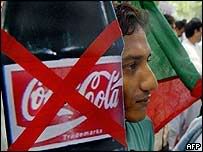 they cost 10,000 rupees a litre. Coke costs 30 rupees for a litre and a half, 270 rupees for a whole acre; so let's thank God, say Indian farmers, and let us spray.
they cost 10,000 rupees a litre. Coke costs 30 rupees for a litre and a half, 270 rupees for a whole acre; so let's thank God, say Indian farmers, and let us spray.
But to be fair, other gaseous drinks can be as effective too, Pepsi to name but one, and another called Thums Up in India. But Coke is the spray of choice in Andra Pradesh, and is the one that pops up most often in folklore there and here: its claimed uses are as lavatory cleaner, denture solvent, windscreen wiper, and for birth control, though we haven't been able to ascertain the mechanics of the latter.
Read Full Story: Things Grow Better With Coke
ß
Let's Spray
Coke is it.
A farmer in Andra Pradesh says that spraying Coke on his crop is saving him a lakh. And we all know that in this pest-ridden world, pesticides are big business — Avant, Tracer, Nuvocron —
 they cost 10,000 rupees a litre. Coke costs 30 rupees for a litre and a half, 270 rupees for a whole acre; so let's thank God, say Indian farmers, and let us spray.
they cost 10,000 rupees a litre. Coke costs 30 rupees for a litre and a half, 270 rupees for a whole acre; so let's thank God, say Indian farmers, and let us spray.
But to be fair, other gaseous drinks can be as effective too, Pepsi to name but one, and another called Thums Up in India. But Coke is the spray of choice in Andra Pradesh, and is the one that pops up most often in folklore there and here: its claimed uses are as lavatory cleaner, denture solvent, windscreen wiper, and for birth control, though we haven't been able to ascertain the mechanics of the latter.
Read Full Story: Things Grow Better With Coke
ß
Let's Spray
Monday, November 01, 2004
News From Tora Bora

Click on the image above for a translation of the story.
See also: Ten Questions, below.
ß
News From Tora Bora




